Coffee Conversations - RT3, Moving the Industry Forward - TRANSCRIPTION
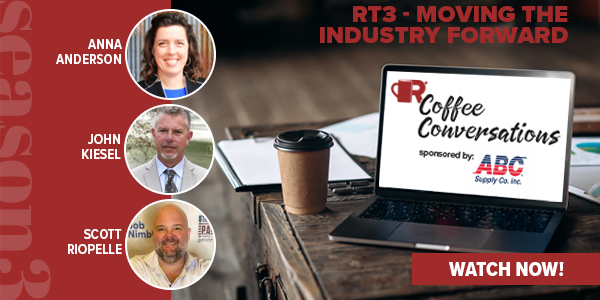
Editor's note: The following is the transcript of an live Coffee Conversations with RT3 members Anna Anderson, Scott Riopelle and John Kiesel. You can read the interview below or watch and listen to the webinar.
Heidi Ellsworth:
Good morning and welcome to the end of 2021 with our Coffee Conversations. Can't believe it's December, this is crazy. But here we are. I'm Heidi Ellsworth with RoofersCoffeeShop. And we are so proud today to end 2021 and start looking at 2022 with some of the top technology thought leaders in the roofing industry. This is going to be a great Coffee Conversations, everybody. Thank you so much for being here today. We are celebrating roofing technology think tank RT3, a group of thought leaders that have come together to bring technology into roofing. I have been so lucky to be one of that group from the very beginning. So today, we've brought some of the brightest together and we're going to start talking about that.
Heidi Ellsworth:
But before we get started, I just want to remind everybody, this is being recorded. It will be available on demand, so you can always share it out to everyone out there. We want it to be shared and especially today. We want everybody to know about what's happening in technology and how they can improve their businesses within roofing using that technology. Reminder, Megan Elsworth, our producer is in the back. She's going to be chatting, she'll be bringing you on. If you want to, she'll be taking your questions, she'll be answering your questions. So be sure to get into the chat box, say hi to each other, ask us questions. We're going to be taking them through the whole hour, this is going to be great. I also want to do a shout out to someone who is on the call and watching, and that's Karen Edwards, who is the RT3 executive director and also the COO and all around amazing lady of RoofersCoffeeShop. So Karen, thanks for being on here. So if you have questions for Karen or how to get involved with RT3, you can chat that all hour too.
Heidi Ellsworth:
So we're going to get started here. Again, welcome to Coffee Conversations. Let's go, let's find out about some great technology that's out there. So first we're going to meet our panel. Oh wait, sorry. First, we are going to thank our sponsor. So ABC Supply is the sponsor of this Coffee Conversation. ABC Supply with myABCsupply has already been leading the industry with technology, resources, and information for roofing contractors. They are an amazing sponsor RoofersCoffeeShop, we love what they bring to the industry, what they do on technology, what they do with giving back. And we've been so proud to have them as a sponsor this year on our coffee conversations. So ABC, thank you, keep up the great work.
Heidi Ellsworth:
Now, to meet our panelists. First, I would like to introduce and welcome Anna Anderson with Art Unlimited and the current president of RT3, also on the executive committee of National Women in Roofing and just all around one of the most amazing influencers in the roofing industry. Anna, thank you so much for being here today.
Anna Anderson:
Thanks so much for having me.
Heidi Ellsworth:
It is. I have to tell you all, when we start talking, you hear the things that Anna researches regularly, I think like at 3:00 in the morning or something, you're going to be amazed. This is all great stuff. So I'd like to introduce John Kiesel. John is the president of Division 7 Roofing and he is also the president of Imagine Technologies. Imagine Technologies is a newer company that has come out that John is leading along with his team. Kerick, I believe you're out there watching. And they are bringing drone opportunities that turn into virtual reality that turn into 3D. He's going to tell you all about it. It is amazing and is one of the technologies that we're going to talk about and that people should be watching for coming from a roofing contractor. So John, welcome to the show.
John Kiesel:
Thank you, Heidi.
Heidi Ellsworth:
It's great to have you. Finally, I'm very proud to introduce and welcome Scott Riopelle, who was the 2020 innovator of the year for RT3. He is out of Denver, Colorado. His company is a leader in using technology in systems that has allowed his company to go in so many states, nationally, and so many different places. And Scott's going to talk more about that and how important it is for roofing companies to embrace technology to really make that difference and go into this new world that we're seeing out there. So Scott, welcome to the show.
Scott Riopelle:
Thank you, Heidi.
Heidi Ellsworth:
Thank you for being here. So what we want to do, we're going to start out. Don't forget, keep asking your questions and putting your comments out there. But we're going to start out with, for each of our panelists, what is the most important technology that roofing contractors should be looking at in 2022? So maybe it's been something we've had, but really what are some of the things out there on the horizon that everybody should be aware of and looking at? And we're going to start with John. John, what should they be doing?
John Kiesel:
Well, I think that the white collar side of the business has technology, just innovation going on with how to keep track of what's going on administratively. The blue collar side of the roofing operation, there's a blue ocean there for integration for technology and how we can bridge the gap between the office side of things and what's going on out in the field. And for us, for me, it's imagery and how you can virtually see what's going on and connect the office to that in real time and be able to influence the activities of the field from an office environment in real time. That to me is the technology that we need to be looking at, is how to bridge the gap between the white collar side and blue collar side of the business.
Heidi Ellsworth:
So really bringing your field in. Really the men and women who are out in the field, who are doing it every day, how can you put more technology into their hands?
John Kiesel:
Exactly. And sometimes that may take a champion. as we like to call it in the industry, that's tech savvy and understands working out in the field to be that liaison person. So you have technology, you have the people you're going to be on the lookout for as well.
Heidi Ellsworth:
Perfect. Scott, what are you seeing in 2022?
Scott Riopelle:
I think for me the hardest is changing of the guard, is the 20 year veteran sales reps, estimators that I have, and bringing up new, young, technology mind sales reps. They have a bazillion ideas. And like I was saying earlier, I feel like this is one of the bigger challenges since going from the double tab ad, yellow pages to Google and going online. And everybody is like, "If you don't get with Google, you're going to be left behind." And everybody was like, "You're crazy, yellow pages aren't going away." But the reason was is the sales reps of the yellow pages were the best in the world. I don't know if you guys have ever dealt with them, but the sales reps were incredible.
Scott Riopelle:
So the Google sales reps were like taking or leave it or there wasn't really no sales reps. So it's just something that just happened and we had to live it. And I think that's what's going on now, is that we have to live it. I think even more importantly than that, I think the back of the house technology is so often missed. We just went through almost two years of free money and the government has to get that back somehow. I feel like audits and I feel like I've been working really hard to keep my book straight because the technology that I'm finding, they're starting to figure out, okay, not only do we need technology for sales, we need technology to keep the sales and the numbers together. And that's something that really everybody needs to focus on in 2022 I think.
Heidi Ellsworth:
You know, Scott, I think that's so great. They're so smart because what we're seeing too, and actually I'm sure Anna is going to bring some comments in on that too, because we have been looking a lot at a APIs and how all the software talk to each other. And if your accounting system isn't talking to your production system or to your sales system or to all of those, yeah, it's leaving you in a delicate position potentially. So I think that's really smart. Really how is your accounting and your book keeping everything integrating in with everything else you're doing so that you know exactly where you're at? And that's tough, it's tough. There's a lot of systems out there.
Scott Riopelle:
A lot to choose from.
Heidi Ellsworth:
Yeah, a lot. Anna, are you seeing for 2022?
Anna Anderson:
Well, I have notes. As everyone know, Anna goes into meetings and she's got this pre-planned agenda. So John hit one thing, it's the integrations so that the entire workforce can be empowered to do their job with excellence. There is that gap. And as you reference, Heidi, is everything truly talking to each other? No, the industry hasn't been challenged to say, we have have to talk, At some level, the information has to be able to flow through and it's not. As you referenced, John, it's bottle-necked at the administration side or as you referenced, Scott, we have siloing happening between different divisions of our company. That is no longer acceptable in the industry, and I think we need to be very clear about that. We need technology as a whole within the industry to embrace that and start collaboratively looking at how do we solve it.
Anna Anderson:
Then we also have this knowledge gap, as you shared as well, Scott and John. I know if you had shared more, you probably would have discussed this. This is something that's not only facing the roofing industry but global commerce. Where they have these amazing superstars who've been in industries for 20, 30 years and they are now transitioning into a new either career path or they're retiring and saying enough of this. So the knowledge gap is a very real thing and what is going to replace it? Are we going to see the virtual reality, augmented reality infuse that knowledge into a new workforce? Or are we going to see robotics take that place, and to what percentile? So there's a lot of exciting things on the horizon for 2022.
Heidi Ellsworth:
You know what, same thing. I think whenever, I don't know, I may sound very American here for a second, but it seems like whenever we have these challenges, the innovation, the creativity of the American people step up and really try to fill those gaps. We've seen that over and over again. And so one of the things that I think is, Anna, just exactly what you're talking about is robotics. We have a labor shortage and that labor shortage is going to continue to cause huge problems for our society. And not just in the US, everywhere, Canada, the whole globally. So how are we filling some of those gaps? What are you seeing on the robotics front? And I'm going to go backwards, Anna, so I'm going to start with you. What are you seeing round robotics?
Anna Anderson:
Well, we're seeing so many advancement from robotics for just the police force, is tapping into robotics. We see the fast food market is now tapping into robotics. We're now demoing with RT3 the robotic opportunity to scan inside of the roof and attic crawl spaces. These are new opportunities to leverage robotics and empower your workforce. Rather you're not taking away from it, you're creating a more stable, accurate solution for that workforce that you have. I think those are some of the exciting opportunities. There's also, when you look at options within Europe, there's robotics that can create whole homes. There's this whole new space that we are now being challenged with in a very real way. We've known it's been available, it has been available to an elite market, but now we are challenged Heidi. We're saying, there's no options anymore. The workforce is diminishing and we need to solve it, and robotics is there. So how to harness it accurately to make sure that there's still stability for the industry as a whole.
Heidi Ellsworth:
One of the things we see with RT3, and this is one of the things that we really focus on, is going out and seeing other technologies. So for example, this last summer, we went to Boxville and we saw how they are using full manufacturing to create a whole house one box with several Lego like boxes to create that. We also just, Anna, you and I just watched this the other day with a video of this small, and we're going to get to drones here in a minute, but this is a small drone that will just bounce off the walls and totally go within any building and check out the attic space, check the HVAC units, all of those things. Where before that would've been safety issues, everything else, or even if someone could get in there, you might have to tear it apart. So we're seeing those every day with RT3 as we're trying to bring some of those ideas into the industry. I see it, it is coming. Scott, what are you seeing? Are you out there on the roof with all your crews with everything that's going on, what's the feel about robotics?
Scott Riopelle:
So I've recently gotten in the solar space this past year. And I got to tell you, there's some incredibly smart, young people in that space. And they're really... I think back to Blockbusters and how the change of the guard happened with Blockbusters. I'm going to be 50. And I was thinking that Netflix was really the next thing and all the younger kids were thinking Hulu and even Disney Plus. So they were two or three steps ahead of what we were thinking was coming next. I couldn't believe that blockbusters was ever going to go out of business. I think that's where we're at now, I feel like the best technology is yet to come.
Scott Riopelle:
I think drones are great, but I think there's so much technology out there and there are so many young smart... Listen, the younger kids, they want to sell roofs and work from home, they don't want want to leave their house. They want to go eat lunch and work their hours and do what they do and achieve the same thing that we're achieving by doing the steps that we've been doing our whole life to get where we're at. So I wish I had the answer. And the answer I have is that I just got to let these young minds be creative and try and follow some of their steps.
Heidi Ellsworth:
And be open to it.
Scott Riopelle:
Yes.
Heidi Ellsworth:
That's one of the things I think that has changed, is before it was like, oh, just don't talk to us about that. But now everybody's like, we've got to be open, we got to embrace it.
Scott Riopelle:
And we got to accept the idea that it could happen.
Heidi Ellsworth:
Exactly.
Scott Riopelle:
We, just don't know how yet.
Heidi Ellsworth:
So when you talk about could happen, it is happening. And John, I would love for you to share what you've been doing with your local schools around robotics. I just think this is so cool.
John Kiesel:
So Eric and Ryan Reesesize they're both very technology sound. And Ryan, our estimator, actually attended a robotics course in high school, which I didn't even know existed. When I was in high school, we had wood shop and maybe KOMAC that kind of thing. But I was surprised to hear that there was actually a robotics course. And Ryan reached out to his instructor from back when he was in high school and they welcomed us with open arms to come in to teach them, talk to the students about photogrammetry and 3D modeling and all the technology that surrounds the imagery aspect. And they brought in a tennis shoe and did a digital twin of the tennis shoe right in front of the students. And they came on glued with the interest of what roofing has on the technology side to offer.
John Kiesel:
I personally started roofing back in the late '80s and our movement, because of that, is how can we focus on the application of roofs smarter? If I go out on a roof today, there's the same equipment being used that was being used 30 years ago. It's a, again, a blue ocean for robotics to interject itself, eliminate three man, four man operations to move heavy materials all around the roof, and automate that process. As soon as we quit being our own worst enemy because we're tough people, we're tough. We're going to make it through the other side, you're not going to give us a challenge if we're not going to rise to it, we're going to be tough.
John Kiesel:
When people come into the industry to say, I'm being tough, I want to be smart, I want this to be one man task not a four man task, that's what we're starting to see now with the reduced crew availability to put four guys on moving bundles of installation around. So robotics is wide open and that's one of the objectives we had with that robotics class, is to introduce a concept for roofing applications to see if they can work on figuring out a prototype for solving that. And they're all about it, so, yeah, robotics has a blue ocean for roofing.
Heidi Ellsworth:
And I don't know if everybody knows this, but I actually have a young man, a very good family friend who was in robotics. And when you're talking about these robotics classes, they are going regional, national, huge competitions. And they're being sponsored by IBM, by Boeing, by all those big ones. So to have a roofing company, John, sponsor the robotics team again, so progressive and showing that roofing we're right up there with everybody else. We don't want all the Boeings of the world to take all those smart robotic kids.
John Kiesel:
Shout out to Butler Tech, we're sponsoring their robotics competition coming up. So hopefully we'll have the vision set on roofing on their robot that's going to be in a competition. So nobody would expect a roofing contractor to be center stage in a robotics competition, that's for sure.
Heidi Ellsworth:
During whatever we're doing, Coffee Conversations or RLWS or any of those, I'm always like, grab a nugget. Everybody should grab a nugget, this is one, write it down, call your local schools, call your VO techs, look throughout your community, and find the robotics teams in your area and start working with them. Not only is it great because obviously for sales, you want to be part of your community, but also look what you may the discover. So I want to shift that way just for a second too and John, go back to you. Owning a roofing company and you have just such a high brand, so many people know you, you've done such an amazing job in roofing, and now to be moving to also starting this technology company, how did that work? That's a lot.
John Kiesel:
Well, it's keeping your mind open. First you have to write things down. So for me, I write things down. I think about positions I need to have filled, I think about the people that need to influence our company. And I write these things down, I pray about them, and I think about them. And then as I start to move around, people just start to come out to ideas. When I go to Best of Success or I go to my peer groups and people start talking, I absorb that information and it normally has a parallel with my thoughts that I had written down previously.
John Kiesel:
But when Carrick, he came into our company to be a superintendent. He had a technology idea. And because I had written down and I thought about technology and how we can use it in our business, my mind was open to the technology integration that he had at his fingertips to explore deeper. So you have to be present and aware of what you want and what you need and look for those opportunities and view them as they're not chance, excuse me, chance situations, they were meant to be and they were meant to be explored. So being passionate about the future of roofing. I've dedicated most of my life to roofing and I'm passionate about changing that experience for the next generation. So whatever that takes, I'm all in.
Heidi Ellsworth:
I love it, I love it. I would like to shift back a little bit to Scott and talk about, as contractors are out there doing their strategic planning for next year, you are so well known for yourselves in marketing. Multiple states, you've grown Interstate Roofing. When I was first with Eagle View, I remember Interstate Roofing, man. You guys were it, and you still are. What are some of the things marketing-wise and sales-wise that contractors should be really focused on in 2022 for their business?
Scott Riopelle:
Well, it's funny, you think back. I remember one day that I was looking at how much material I was losing from not measuring the roof properly, my sales reps. Because back then, shingles were seven bucks a bundle and no one really cared. I went to the local rock climbing gym and I hired all the rock climbers to go diagram all my roofs. And they used to ride around on their motorcycles and do my material orders and diagram my roofs. And when I see an eagle view, I was like, "Oh my God, this is crazy, this can really happen? And a light went off and I'm like, "We need to go further, we need to dig further, we need... Okay, so what's our next challenges?"
Scott Riopelle:
So I think a lot of our challenges have shifted from COVID because it forced us to go paperless quicker, it forced everybody that was fighting it to get on board. And I'm using that as a tool in my company to embrace the paperless. My goal was to be paperless by the end of the year, I did not make that goal. But my goal is to be paperless by second quarter of next year, I had to extend it because I didn't realize how tough it really is to go paperless when you have a warehouse full of a 100,000 jobs that we've done and different diagrams and how to get that. How do we make that jump? How do we get that sales rep to go from Google to knocking doors or to referral based?
Scott Riopelle:
You can't just walk into a real estate office anymore, a property manager office anymore, they look at you cross sided. So how do you get to that? You can't go to the traditional baseball game or basketball game with them to get that job, we have to think further, we have to... How do we get to them? Drip campaigns, social media, how do we use Google but not make Google 90% of our business? And for me I've made videos, I email blasts, and try not to overwhelm them with all roofing. Roofing is boring, there's nothing sexy about roofing. So what I've done is I've integrated solar. And by integrating solar, everybody wants to talk about solar, but does everybody want solar? Is everybody going to need solar?
Scott Riopelle:
Solar and roofing have always been apart, they've been pushed apart. I think this year is really where we have to bring it together because I believe that that's the future, that's the technology. Some of the biggest roofing companies, shingle buyers in the country last year were solar companies. Solar companies are actually going roofing. We need to go the other way, we need roofing companies to go solar. We have to start saying, we're going to put holes in our new roofs we did because we know how to seal them the best.
Heidi Ellsworth:
I think, Scott, that is so key. Okay, there's another nugget, everybody take that. Because I've been watching solar, I've been involved with solar for pretty much my whole career. And every year I'm like, "This is the year, this is the year." It's finally going to happen, but it takes a really long time. And I agree, there will come a point when there will not be a roof unless it's under the pine trees of maybe where Anna and I live, but there will not be a roof without solar on it. And so getting in now in that technology and understanding it is only going to make your business sustainable for the next 100 years or longer because that's where it's going 100%. Anna marketing, everyone knows you are the leader in marketing out there working with so many different roofing contractors. What are we looking? What are some game changers coming up this year and in the next couple of years in marketing that contractors should be aware of?
Anna Anderson:
I think a foundational component is speed, you have to be fast everywhere. And it's not only your website, but your response time to social, it's your response time to incoming opportunities or phone calls. It seems so basic but yet it is a metric that the Google that you speak of as Scott is measuring you by. It is the social platforms. And I think so many times we get caught up is, what is Google saying? But in reality, we got very caught up with other platforms if we look back in technology. And we need to focus on what are the elements we can control? You can control speed, you can control your ability to respond, and you can also control how personal are we. And those are the elements that transfer between platform to platform.
Anna Anderson:
We are seeing some transitions within tech. And I do believe that there are challenges happening. We're seeing multiple Amazon server outages, we're seeing other massive server warehouses having ebbs and flows. That's creating shortage of technology opportunities, it's creating shortage of materials. And those are some challenges that are happening within the marketing world too and so there's new opportunities coming. So we're looking at tech stacks evolving, there's new mergers happening, there's lots of opportunities that are bubbling up that are forcing the metaverse to start to say, okay, what is the digital real estate looking like? And how do you get into that world? So so many exciting things. But I would say, what are things you can control? It's your response time, it's your speed, it's your personalization, as Scott was saying, it's being an influencer, and leveraging AI, it's so many different things. But what can you control? Focus on that.
Heidi Ellsworth:
And I think what we talked about, actually, we talked about this before it started too, is really looking at what you have. Where are you? Does your website have landing pages? Does it have forms? Does it make it... Is it going to the right people? Are they responding? Sometimes the technology can be... We see all these big things, but really down, make sure you have a website that it's working well, that you're on social media. Those are some of your foundation that you need to build on.
Anna Anderson:
As you shared, all of us on today's call, we get really excited about big ideas. And then we come back to a reality and go, oh my goodness, this foundational component, time out, how did we let this slip? So I would say don't forget that as we get excited about, I'm excited about quantum computing and cryptocurrency and going into this new metaverse. But are we answering our phones? Are we personal? Are we fast? Let's not forget the things we can control.
Heidi Ellsworth:
That is so wise. And I want to ask everybody out there, you have to have questions or chats or some things, please, please go into your chat, ask questions of these experts. We just thank you, Wendy Marvin. Anna, she said you're just a genius in our industry, and I agree 100%. Those are the things, please bring your questions because these folks have it. So I want to switch over a little bit here because there's just so much to talk about. But one of the big ones that we... And maybe it's just because I've become such good friends with John lately, that this is on my mind all the time anymore. And he's going to convert me.
Heidi Ellsworth:
I'm going to admit, and when we're talking about virtual reality and goggles and living in this world, I have incredible motion sickness. So I've been like, no, I can't do it, John. But he's helping me, helping me to get to this thing. So we've seen it. We've seen it with Racklt Roofing, what they do with their safety training, we've seen it across where Ken Kelly with Kelly roofing is using virtual reality. John, you are the leader in really taking that place with virtual reality, what is happening there and how can contractors start incorporating it?
John Kiesel:
The challenge of VR is that you're saying it's not for everybody. You have to be specific with the challenge or the problem that you're trying to fix. So that's really the desire that you need to focus on. We've used VR for sales presentations, we've used VR for training, we've used VR for collaboration and meetings. And just to throw it into all kinds of different arenas to see where it sticks. It doesn't stick everywhere, it's definitely a specific use case that you can work on perfecting. And communication between the field and the office again, is that main sticking point that we want to focus on maybe. And that's through hollow lens or that's going to be through VR. But the VR creates challenges of just setting up that some people have experienced and the older, my 10 year old son set up my for me. So really the VR is worth exploring when I put out. I think we could hold this meeting today in VR and have a meeting and have our digital likeness be represented in a room and be presenting in VR. So there's very cool stuff.
Heidi Ellsworth:
I do have to say, John is challenging the RT3 crowd across the board. And actually we're looking at a future RT3 virtual meetup being in VR so that we can all get a better feel for that and try it. So these are the things, going back to RT3 and what they're doing, is this constantly pushing that edge, building on the foundation but pushing the edge of how we can do different things. Scott, have you had much experience or are you hearing anything about... I hear a lot of, even when it comes to FaceTime, getting the younger generation on the roof, having the older generation who maybe can't be on the roof as much in the office answering questions about the roof, whether that's through goggles or through even just the phone. What are you hearing in that world?
Scott Riopelle:
So I remember using the flip phones and the old little pictures to try and show the homeowners the hail damage on the roofs. And my first experience with the VR goggles, of course, was through SVG, when the store they had these goggles and I thought Anthony is crazy. But the truth is, is that there is so much of that going on. And I'm very fortunate that I'm on the Western States Board of Director and I'm also a member of the DFI group. So I get to see all the different technology. And if I can't stress enough to everybody, and the RoofersCoffeeShop and the RT3 Group and best of success, I try to be a part of so many different, and it's time consuming.
Scott Riopelle:
But to your point, I guess I'm not doing it to the best of my ability, as John said, we're our own worst enemies. Because we still want to do it, I still want to get on the roof with a toolbox talk and have everybody sign the paperwork for the safety, instead of give them goggles, say, watch this. And I forget by hitting except on your cell phone is good. That's going to... But is that going to be good for OSHA? So not only do we have to make it acceptable within our culture of roofing, we have to make it acceptable within the people that we works culture, OSHA, the manufacturers, the suppliers. And a lot of them are spending a lot of money to help us bring that together I think. So I think 2022 is the year that a lot of that technology is going to launch and I'm excited.
Heidi Ellsworth:
I am too. And the Roofing Alliance right now is doing a huge study on this, when it comes to safety also. And that's where I heard a lot about the folks. Josh Kelly, with OMG reported on the goggles and doing the safety and ladder safety and all of that. So it's really there's so many different applications, Anna, what are you seeing on VR?
Anna Anderson:
Well, I was thinking back as the guys were sharing. In 2019, I was able to meet with a Harvard professor and he said, "Here's the future of the consumer's journey. And this is going to change our entire existence." And I'm like, "Wow." Put on these glasses. You would've never known I went into a VR mode because we're used to these big things. And all of a sudden my existence was transformed. But yet everybody around me said, "You're just wearing sunglasses." And they're very light and they're very nimble and people go, "No, it has to be this big thing." I think we're going to see that transformation of the consumer expecting it, easily adapting to it. They have learned how to adapt quickly. And then from the contractor's side, empowering the workforce. And as a John shared, we're also seeing those new team members, they want that type of environment.
Anna Anderson:
So there's this in between period where we see the workforce like, "I don't know." But the older workforce says, "Okay. But train me how to do it and I'll just talk. I'll talk, I'll figure it out." And then we have this up and coming opportunity. So I think from the sales and marketing side, it's very, very exciting. We also have the global space where consumers and humanity is adapt to changing quicker. Even though we don't always want to, we've been forced to change quickly. So it's going to up many different gateways for the VR to become a common day occurrence.
Heidi Ellsworth:
I think it's really interesting too because I just saw a commercial on on TV with those glasses that have the cameras in them. So you can just do video as you're walking. No one even knows you're doing video, which scares me. But you can have these glasses on with a video. So when you think about that and you think again, to John's very first comment, of how are we incorporating this into the field? If safety glasses can have cameras that can be switched on and then have a conversation back in the office with somebody who maybe has more experience and answer those questions.
Heidi Ellsworth:
Or even give something to your building owner, go up on the roof, walk around with your glasses on, and they're watching as you're going and you're talking to them. They don't have to go up on the roof with you. There's just so many applications that I think are going to change how we do business and it is going to be this younger generation that brings it in. John, are you seeing that with VR, of anybody starting to use it on the roof and talking back to the office or to their customers, or is this still kind of we're all talking about it?
John Kiesel:
We're actually using VR with our customers, mailing out a VR headset, creating a virtual environment on demand, and having a custom experience in VR. A lot of the VR experiences people are having right now are a cartoon type of environment, static, and if you subscribe to a service maybe with a safety type of program. But we're able to custom integrate 3D models of properties and collaborate in VR with people that have never seen a roof, they're just in control of the money. And when you're able to put them in that immersive environment and see the consequences, they're very much moved to spend the money versus somebody just trying to explain it to them. And the same with safety and talking to building owners about safety products. Do you know what it's like to be on the edge of a 40 foot building and looking down the side of it? Do you to put your HVAC people in that danger? So it's very powerful when you put people in that immersive environment to feel or to experience those other senses of sight and just overall feeling.
Heidi Ellsworth:
As you're looking at that too, John, I just think this is really... Since you're already doing it, how can contractors... What's the first step? Is it Google it, Amazon? How do you make that first step to starting to do what you're doing?
John Kiesel:
Well, they can co contact us and we can help them with whoever's... You have to be internally motivated to accomplish the goal, that's the first step and be real with yourself. It's sexy to Scott's point, roofing is not sexy. When you see something in roofing that is sexy, we can get falsely dedicated to the cause where we really don't have it in us to complete the mission. So the first step is be honest with yourself if you really want it and not be afraid of it being a different type of endeavor in your roofing company. Because technology isn't what we've all been doing for the past 40, 50 years.
John Kiesel:
I come up against that statement more than I want to, let's just do what worked for the past 40 years. Well, I don't think what we've done for the last 40 years is going to work for the next 40. So that's really the first thing, be honest, be true, make sure you want to. And it's not a very expensive endeavor, really it's not, especially when people plow the way and done the R& D. So find the champion, find the techy person that embraces this stuff, and start picking their brain and see how they can help you.
Heidi Ellsworth:
Put it together, I love it. Some great comments and points here from Wendy. Thank you, Wendy Marvin. And for anyone who doesn't know, and there's probably no one who doesn't know, but Wendy is out of Vancouver, Washington, has an amazing matrix roofing, and she was saying... And John, I mean, Scott, Anna, this all goes to what thing is, how about the cost of savings of having an employee off for COVID exposure being able to work with a less experienced employee on the roof? And so that's whether that's they're out for COVID or out for some other reason, whatever it may be, being able to have them be in that communication. That's an excellent point. And also when I asked what's that first step, Wendy was saying, the first step is being on a call like this at 7:00 in the morning, listening to all these industry leaders. Thank you, Wendy. I love it. Yeah, seven o'clock.
Heidi Ellsworth:
But I think when we look at things, one of the things that I want to bring up on this is, and I'm going to go back, rack roofing was one of our innovators of the year, I think our first one, our first innovators, Anna? Yeah. I have always learned this from them, but they wanted to get a translator. They were like, "How can we better culturally understand multiple languages within our own workforce, within our customers? What do we need to do?" And on Amazon, they found these earbuds that are translators from Google. They now use them with their entire workforce, and they work, and they bought them off Amazon. So it's not always that difficult. You think there's these huge barriers, but even getting, and I'm going to John, order some of those glasses, order the VR, start having some of your younger people open that up for them to work and do things helps you get into that place a little bit faster as you're going through.
Heidi Ellsworth:
And sometimes it's this easy. I really do this as easy as Googling it and just trying out the technology from a consumer standpoint. I do want to bring up... And you just said this, John, and I want to start with Scott on this. But Scott, to me, it seems like every business in order to really embrace technology needs champions within who are going to champion that technology, tell us... We know you are a champion, but did you have other champions in your business? And how did that help culturally within your company?
Scott Riopelle:
Well, Heidi, first thing I want to talk about is you talk about Google, and as an owner of a company, I need to hire out, I can't do it all. So I have to either do it internally or hire it out. And weekly and monthly and I check all my different positionings and all my different marketing, I do that myself. Because nobody cares about it as much as you care about it yourself. And Google, everybody on here needs to know that Google just had an update and that they did. And they do it maybe every couple of months, every year, wherever they feel like it. We went from number two to number six, and now we're back up to number four and working our way up. But the point is that I have to have a team behind me doing that work because I'm not able to do it.
Scott Riopelle:
I hired, I don't know, maybe eight or nine years ago, I hired a kid, a door knocker. And he's worked his way up in my company and he's 29 now and he's been with me for eight years. He is innovating the technology, he is working on ordering, how are we going to stop being so clunky and ordering our orders through the Beacon PRO+ or through the ABC apps or through the SRS, all the different apps that they have, how can we... Because still it takes somebody with a brain to figure out how to solve that problem with technology. I guess I got lost on the [inaudible 00:49:06] I'm sorry.
Scott Riopelle:
I've always had to stay updated. It's so hard because we forget without the sales and marketing piece and without... That's another thing like the website, if we don't redo our website every couple of... Most people I talk to, they're like, "Oh, I got a brand new website." And we look at it and it's like, that's five years old, it's outdated. Your website has to be every year, every two years, it has to be updated to keep your position, to keep where you're going. Because we forget the first thing people do to look at you is Google. They go to their computer and they want to see that you have 500 reviews, that you have a 4.7 star, that's the base of it. Everything from that, you grow with marketing and technology. Because without the work, you can't afford to spend the money on technology.
Heidi Ellsworth:
And what I love is you talk about the 29 year old, your technology champion in your business, and still with you, still bringing all the new stuff in. And you're getting out of the way, you're encouraging him, you're championing him. I think that I found the same thing in RoofersCoffeeShop. I get in the way of technology a lot of times, and so I trust Karen Edwards, who's on here. I trust James Elsworth, I trust Megan Elsworth. These are the people you have to get out of the way and let the people who really are good at it champion it and continue to grow that. John, I know you have Kerick and I know you have a lot of different people there. But how are you using champions within your company to get everyone else to start embracing it?
John Kiesel:
That's an interesting dynamic. I really didn't think about it in the way that I do now. And it came from somebody that was just visiting our office, that we were talking about technology. I said, "We're not a technology company, we're a roofing company." And the gentleman that was in my office said, "John, have you looked around you, at all the people that you've hired? You have a technology company." So that's one of the characteristics we look for, and everybody we hire has that ability to swing the technology stick. And really fortunately it's part of our culture now. So everyone contributes to technology, that's just not one person. It probably started with one person, and that would have, I don't want to point to fingers, maybe it was me in my own really small level of ability. But I was always intrigued by others, they really can make this stuff sing. And that's just what I'm attracted to. So everybody's responsible for it.
Heidi Ellsworth:
I like that, that's great. You have multiple, multiple, multiple champions. Anna, I would love for you to share a little bit your journey, not as much on the roofing companies you work with, but our unlimited journey. Talk about embracing technology and having champions with in your company. You were doing software development, you've really taken to the next level. Maybe you can share that a little bit with everyone.
Anna Anderson:
So technology is everywhere around us. And as you say, creating champions, creating new opportunities within your business, we have been striving as a leadership team in our business to say, "Okay, you always see those gaps." But as a leader all the way through the company, implementing the solution to that gap is where we struggle. So we have said, okay, you have to clearly document the vision, you have to identify what key role and responsibilities or seats are impacted by that vision and that change. Then what we've said is, when we take that vision, we have to create a small pilot group. That pilot group of individuals is from different sectors. And they come together and either I or whoever has that key vision, like you, John, you imparted that into Kerick and other team members, they're passionate about it now.
Anna Anderson:
So I'm thinking about a certain project I'm working on. And I have three individuals who are very passionate about this project with me now, where it started six months ago with just myself. Now we have a small team. We're proving the concept and we're creating buy-in from the entire company and now beyond. I think that's key. The other thing that I look at is anytime you want to create champions, you have to understand there's cascading messages that need to be documented. And how are you creating that messaging so it's not from vision to onsite application is so diluted that people look back and go, this is stupid, why am I putting this thing on? It's broken, the person isn't showing up on time, the information isn't relevant, all these different pieces. But the idea was brilliant.
Anna Anderson:
So it's really taking from idea to implementation. That's why we don't always have champions across the company because we then pause. And we take time to slow down, to speed up, to make sure that we have that pilot group that can infuse and impact the entire company or beyond. And then we say, okay, here's our cascading messages internally, externally, and present and future. So that has been something I've been very passionate about the last three, four months. Because without effective communication, the vision is lost, the champions aren't created.
Heidi Ellsworth:
Exactly.
Anna Anderson:
So we have been making many, many changes in our company. But I just wanted to share that because I think that's, regardless of who you are, where you're at, it resonates.
Heidi Ellsworth:
It resonates with me. I'm I'm sitting there going, "Yeah, yeah, I know exactly what you're talking about." And from a very small company to very large companies, it happens, it just doesn't matter. Well, as always, this hour has flown by. And so I want to take a little bit of time now. Anna, let's talk about RT3. RT3, you're the president of it. It started as an idea that a lot of people didn't get either. And we've had some passionate people, champions, you being the lead. Why should anyone in roofing, why should they get involved with RT3?
Anna Anderson:
Well, the roofing technology think tank is dedicated to finding innovation and taking that innovation and technology and bringing it to the roofing industry. So we're not just looking within the industry, we're saying, what's out there and how do we bring it in? We have 100 members, it sounds very small. But that membership is designed to say these are active members, we don't want just passive members, we want active members. And then we have the community of RT3, where you can join, gain access to some of the innovative information that is being cultivated through the membership, and tap into it. So I would challenge people who are on the call today or looking at joining RT3 down the road, when they're watching this webinar on demand, to check out the website. And from there, see the opportunities that are available to your company. Maybe you're not in the industry but looking at saying, maybe like Scott shared solar, solar can have that impact. You could join RT3 or you can learn about the roofing industry through the RT3 community and the technology you offer, how can it impact the future of roofing? So very excited.
Heidi Ellsworth:
In the chat, Megan has the website for RT3. The RT3 community, let's talk about that just real quick because there are two levels. There is full membership, which none of it is very expensive, to be a full member it's $500 a year. But there is a cap on that, so you need to get on a waiting list. But to be in the community, there is no caps, it's only $250 a year, and you get to be with all these people. This is the thing, this is... I know we do a lot and we're all out there. This new Cleo drone, I'm just jazzed about going into HVAC and stuff. We get to bring, we see something, we see a press release, we see something in another industry, and all of a sudden we're like, "Oh, look at this." And then it just blooms.
Heidi Ellsworth:
That is really what RT3 and that community is all about. And as we're getting back into trade shows, we're working on doing popups, where you can meet and network at the trade shows for RT3 and just talk, geek out, and talk technology. That's what you can do. So really looking at this and being a part of it, I think is so important. And I can't believe we're down to the last minute. So I want to say John, Anna, Scott, thank you so much. Thank you so much for all your wisdom today and for being a part of this coffee conversations about technology.
Scott Riopelle:
Thanks for having us, Heidi. Thanks Anna.
Anna Anderson:
Thank you.
Scott Riopelle:
John.
John Kiesel:
Thank you.
Scott Riopelle:
Thank you to everybody that... And if anybody has any questions, please feel free to ask us.
Heidi Ellsworth:
Yes.
Scott Riopelle:
Our phones are always open.
Heidi Ellsworth:
You can get to all of these folks through RoofersCoffeeShop, just email us, we can connect you. You can get through to all of this team through RT3, emailing, getting involved with the community and you'll be a part of all of that. So as you're looking at this, please think about RT3. And if you do nothing else, follow it.
Scott Riopelle:
And don't forget social media, Heidi.
Heidi Ellsworth:
Yes, follow us on social media, sign up for the e-news, the smart brief. It's amazing how much great information is out there that you can bring into your life every single day. I want to thank all of you. I especially want to thank ABC again for being not only our sponsor but a leader in technology. As Scott said earlier, everything's changing online ordering, knowing where your trucks are, all of those different things, and working with distribution. And a company like ABC, we appreciate your sponsorship so much. And appreciate you leading the away on this.
Heidi Ellsworth:
And then, I can't believe it, it's the new year. It is just like going so fast and we are so incredibly excited about our next Coffee Conversation. It is going to be January 13th and it is going to have Reid Ribble. One of my favorite people to visit with, he is just amazing. And it's going to have William Stout with Rebuilding Together and Brandhi McElhaney, sorry I said her name, from Informa with the IRE and Bill Bellico with Sika. And they're going to be talking about community service during the IRE Week. What the roofing industry is bringing to New Orleans, how it's working. You don't want to miss this. Talk about ultimate giving back and also a lot of fun stuff is happening with IRE. So it'll really get you ready as we all show up in New Orleans.
Heidi Ellsworth:
On that note, RT3 will also have a panel at IRE. And we will be have being talking technology, talking about how to incorporate into your business. We invite all of you. Please when you're signing up for IRE, sign up for the RT3 panel. It's this and more in-person. So you can walk up and talk to everybody afterwards. So thank you so much. We will see you in the new year. We at RoofersCoffeeShop are all so thankful for all of you. We wish you happy, happy holidays. And thank you for being a part of our community. We'll see you in the new year. Thanks.
Anna Anderson:
Take care, everybody.

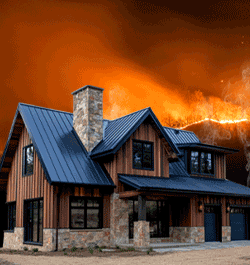











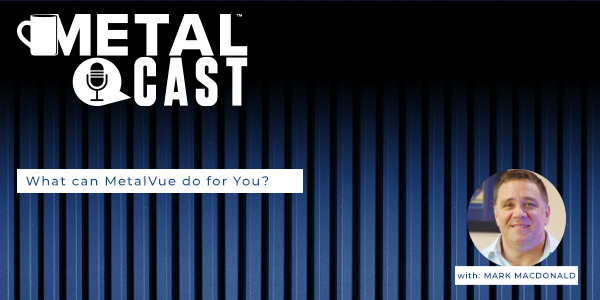
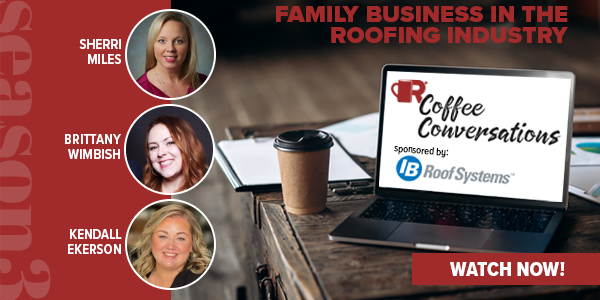
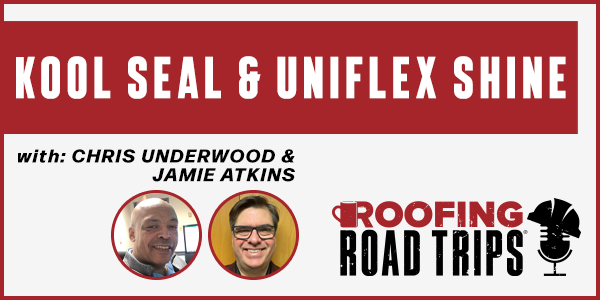



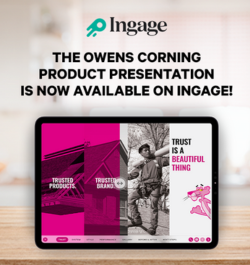


Comments
Leave a Reply
Have an account? Login to leave a comment!
Sign In